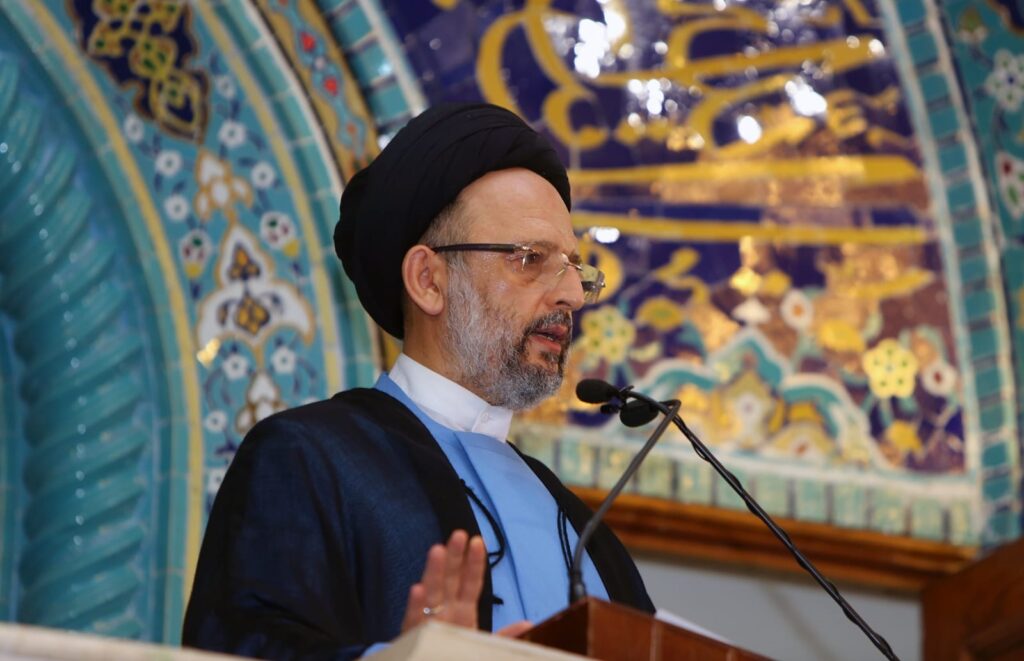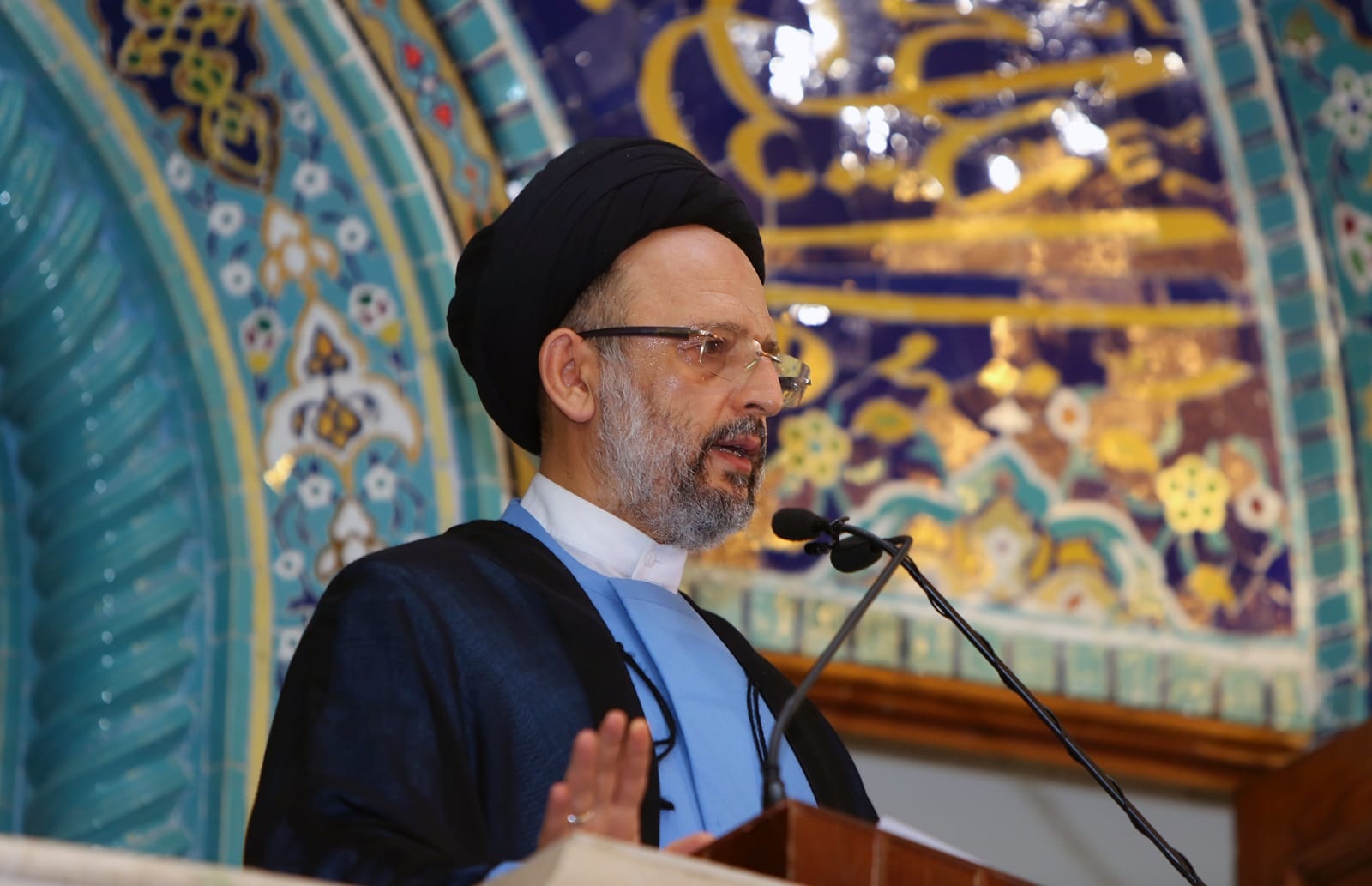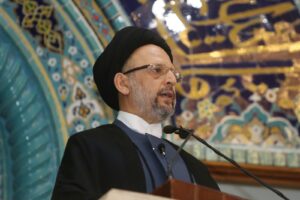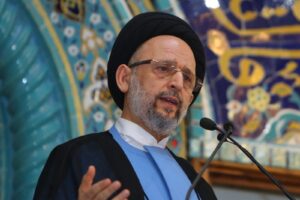In The Name of Allah, The Compassionate, The Merciful
.
His Eminence, Sayyed Ali Fadlallah, delivered the two Friday prayer sermons at the Imamain Al-Hassanain Mosquer,RAJAB 10, 1446/January 10, 2025. Several prominent religious scholars, dignitaries, and hundreds of believers attended the Jumu’a prayer. Following is a summary of the sermons:
The first Sermon
We meet today, on the tenth of the sacred month of Rajab, to commemorate the blessed birth of the ninth Imam of the Ahl al-Bayt (a.s), Imam Muhammad ibn Ali Al-Jawad (a.s.).
The name of this Imam is associated with generosity due to his abundant giving, hence he was titled “Al-Jawad”. This Arabic term means the one who gives extensively, without limits, and with love and desire to give. His giving is spontaneous and without being asked.
Imam Al-Jawad (a.s.) assumed the position of Imamate after the death of his father, Imam Ali Al-Rida (a.s.), despite his young age. Like all the Imams of the Ahl al-Bayt (a.s.), he was distinguished by knowledge, forbearance, worship, great morals, and extending a helping hand to the poor and needy. Al-Ma’moun, the Abbasid Caliph at the time, offered him marriage to his daughter due to the Imam’s virtues, despite objections from Abbasid nobles who questioned his knowledge and young age, fearing the transfer of the Abbasid Caliphate to the Imams of Ahl al- Bayt (a.s.).
Al-Ma’moun responded to their objections, saying: “Woe to you! I know this young man better than you. He is more learned in the religion, knowledgeable about God, His Messenger, and the Islamic law… If you wish, test him to confirm what I have described.” They agreed, choosing the chief judge, Yahya ibn Aktham, a renowned scholar, to prepare difficult and complex questions. The debate took place in the presence of Al-Ma’moun, scholars, and dignitaries, where Imam Al-Jawad (a.s.) answered all the challenging questions, demonstrating his vast knowledge and silencing the chief judge.
Al-Ma’mun then addressed the attendees, saying: “The Members of this House have been endowed with virtues. Their young age does not prevent them from achieving perfection. The Prophet (p.) invited Ali to Islam when he was ten years old, and he accepted it, and he did not invite anyone at that age as he invited Ali.”
Today, we will take this blessed occasion to refer to some of the sayings of this Imam to benefit from them in our lives.
The first saying: One day, a companion came to him, talking about the blessings and goodness of that day. The Imam (a.s.) replied: “O Abu Hashim! God’s blessings upon us have increased today. Do not attribute the blessings to the day, for the day cannot delay or advance anything. Rather, if blessings come to you on any day or time, attribute them to God , for without Him, none of this goodness and giving would exist. God is the One Who gives and withholds.” This was also pointed out by the Prophet (p.), who used to say when receiving good news: “O Allah, no one brings goodness but You, and no one wards off evil but You, and there is no power or strength except with You.”
The second saying: “It is enough for a person to be a traitor if they are trusted by traitors.” According to Imam Al-Jawad (a.s.), a traitor is not only someone who fails in their responsibilities or harms people’s interests, whether those responsibilities are religious, political, social, or in a position of power, but betraying also includes those who support, aid, and fight to establish their positions or justify their actions.
The third saying: “The record of a believer is their good manners.” This highlights the importance of ethics in Islam and the high status a person attains through good morals in the view of Allah. As mentioned in the Hadith: “A person reaches the highest ranks and honors in the Hereafter through their good morals, even if their worship is weak.”
” It was said to the Messenger of Allah (p.): “So-and-so fasts during the day and prays at night, but she has bad manners and harms her neighbors with her tongue.” He said: “There is no good in her; she is among the people of Hell.”…
The fourth Hadith: “Three qualities, if found in a person, will prevent regret: Firstly, avoiding haste.” One who is patient does not regret hasty words, decisions, support, or rejection. As stated in the hadith: “What destroyed people is haste. If people had been patient, no one would have perished.”and “With patience comes safety, and with haste comes regret.”
Secondly: “Consultation.” One who consults with knowledgeable and experienced people and does not stubbornly hold to their own opinion reduces their mistakes and benefits from others’ experiences and opinions. As stated in the hadith: “Whoever consults people shares their minds.” And in another hadith: “Consultation is the eye of guidance, and he who is self-reliant in his opinion is in jeopardy,” and “He who consults will not fail.” This behavior is important, as Allah commanded His Messenger (p.): {And consult them in the matter. And when you have decided, then rely upon Allah} and {And their affair is determined by consultation among themselves}.
Thirdly: “And whoever relies on Allah” and depends on Him in their affairs, relies on a strong support, as everything is in His control. Allah is the One Who controls provision, victory, and management, and nothing happens in life without His command. As stated in the Hadith: “Relying on Allah and depending on Him is salvation from every evil and a shield from every enemy.” In the verse: {And whoever fears Allah, He will make a way for him and provide for him from where he does not expect. And whoever relies on Allah, He is sufficient for him. Allah will accomplish His purpose. Indeed, Allah has set for everything a decree}.
The last Hadith: “The greater Allah’s blessing upon a servant, the greater people’s burden on him. Whoever does not bear that burden exposes the blessing to loss.”
In this Hadith, the Imam(a.s.) wanted to warn those whom Allah has blessed, whether with wealth, status, or position, that they expose these blessings to loss if they do not help those in need. Allah will transfer these blessings to those who fulfill their duties towards them.
Beloved ones: Let our sincerity towards the Imam on his birthday be by following his guidance in our lives, thereby expressing our love and loyalty to him and being as he wanted us to be. He said to his lovers and followers: “Be an adornment for us, not a disgrace upon us.”
Peace be upon Imam Al-Jawad , on the day he was born, the day he passed to his Lord, and the day he will be raised alive.
The Second Sermon
In the name of Allah, the Most Merciful, the Most Compassionate
Servants of Allah, I advise you and myself with the advice of Imam Al-Jawad, who called for “three qualities that bring Allah’s pleasure upon a servant.”
Firstly, “frequent repentance” -for It is the door that Allah has granted to His servants to erase sins, both small and large, to increase sustenance, and to ward off calamities. It is the best supplication and the greatest act of worship.
Secondly, “lowering the wing” – by helping people, showing kindness to them, and speaking gently
Thirdly, “frequent charity,” which is a means of repelling calamity and reversing fate.
We are in great need of these qualities to help us overcome difficulties in this world, to be more aware and capable of facing challenges.
We start with the agreement reached among the political forces represented in the parliament, which led to the election of a president for the republic. Although we understand the reservations made by many deputies regarding the application of the constitution, this agreement was awaited by the Lebanese people for a long time. They almost despaired of achieving it due to the division within the parliament among the political forces over the name of the president and even the program he would adhere to during his term. We hope that the election will open the doors to achieving the remaining entitlements, whether it is the regularization of the work of state institutions and filling vacancies, or facing the economic and living challenges, or confronting the widespread corruption that has brought the country to this decline, or the continuous aggression on Lebanon by the Zionist enemy, who does not cease its violations of Lebanese territory, whether in the air or on the ground, and the threats from its leaders that it may not withdraw from the occupied Lebanese territories or parts of them. This agreement happened when it became clear that consensus is the only way to secure the entitlements and face the difficult challenges awaiting the president and those who bear responsibility with him. It is not possible in this country to follow a policy of monopoly for a sect, a sect, or a political position or marginalize them, as consensus is the foundation upon which this nation is built, and it is the basis of its continuity.
We appreciate all the efforts made to reach this consensus, and those who facilitated its achievement, which would not have happened without them, although we want it to be based on the will of the Lebanese, not on regional and international will, which came after the political forces represented in the parliament failed to consult together, sit at one table to agree, and achieve the required consensus and reach it.
We reiterate that the political forces were able to secure this entitlement on time, more than two years ago, without wasting all this time, with the will of these forces, if they had decided from the beginning to step out of their narrow interests and external bets, and listen to each other.
We hope that the new president, whom the Lebanese people have been waiting for, will live up to the hopes we aspired to and called for, which are to strengthen unity among the Lebanese, build the pillars of a state of institutions, a state free of corruption, monopolization, quota… a state capable of bringing this country out of its crises and the suffering of its people, whether on the living, economic, and security levels, a state that possesses a strong army capable of protecting this country from all those who want to undermine its security, sovereignty, and stability, especially the Zionist enemy who will continue to threaten its existence, and who still occupies the land it seized or parts of it… A state directly responsible for reconstruction, rebuilding the country, healing the wounds of its people, returning full deposits to depositors, a state of national, sectarian, and political balance, which embraces all segments of the people, and opens up to the Arab and Islamic worlds and the world, in a manner consistent with the interests of this country, its sovereignty, security, and stability.
In the context of highlighting the dangers of the Zionist enemy to Lebanon and the countries of the region, we point to the seriousness of what was published by a website affiliated with the Israeli Ministry of Foreign Affairs of a map of the Zionist entity that includes the West Bank and lands from Jordan, Lebanon, and Syria, which reflects its vision for the future of the Zionist state. This is not hidden by many of the enemy’s leaders in their statements and positions, in addition to what is shown by the movements of the enemy’s forces, whether in the West Bank and Gaza, or in Lebanon or Syria, indicating that the enemy is serious about implementing what it announces. This requires us in Lebanon to be vigilant, cautious, and watchful, and to do everything that would give Lebanon the immunity and strength necessary to confront any Zionist ambitions in the present or future. It also requires Arab and Islamic countries to be deeply aware of the Zionist objectives, which necessitates a call for joint Arab and Islamic action to confront this project and prevent its realization.





